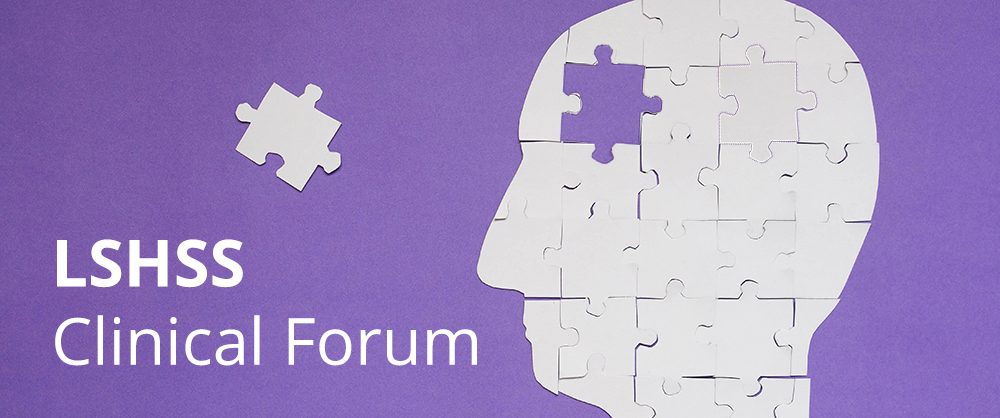Working memory refers to the brain’s ability to store and manipulate information while comprehending or problem-solving. The latest clinical forum from Language, Speech, and Hearing Services in Schools (LSHSS) provides a selection of articles on working memory in school-age children. This topic will be of particular interest to readers working with students with language learning difficulties, as these are typically related to difficulties with working memory. The forum includes the following articles.
- A review paper in which authors discuss and compare three popular models of working memory. The three models attempt to explain how information is retained and how it decays if not rehearsed or refreshed.
- Three research articles examining executive functions and working memory in bilingual children, in predicting math gains, and when working with children who are poor decoders.
- Four papers on clinical applications explaining the relationship between working memory, language, and auditory processing; reviewing research on working memory interventions; and presenting five guiding principles for developing working memory interventions. These guidelines state that although the capacity of working memory cannot be directly manipulated, instructors can use a number of guides and tools to functionally improve working memory capacity.
As Forum Editor Ronald Gillam writes, “[t]here is now a vast array of research results demonstrating that working memory has an impact on children’s language development and their ability to profit from the classroom curriculum. Speech-language pathologists, audiologists, and other regular and special education professionals need to understand what working memory is and how to incorporate this knowledge into their assessment and intervention procedures.” We hope our members can learn from these articles and put some of the many ideas exchanged in this clinical forum into practice.
Explore the Clinical Forum
Gillam, R. B. (2018). Introduction to the Clinical Forum: Working Memory in School-Age Children. Language, Speech, and Hearing Services in Schools, 49, 337–339. https://doi.org/10.1044/2018_LSHSS-WMCLD-18-0056
Adams, E. J., Nguyen, A. T., & Cowan, N. (2018). Theories of Working Memory: Differences in Definition, Degree of Modularity, Role of Attention, and Purpose. Language, Speech, and Hearing Services in Schools, 49, 340–355. https://doi.org/10.1044/2018_LSHSS-17-0114
Arizmendi, G. D., Alt, M., Gray, S., Hogan, T. P., Green, S., & Cowan, N. (2018). Do Bilingual Children Have an Executive Function Advantage? Results From Inhibition, Shifting, and Updating Tasks. Language, Speech, and Hearing Services in Schools, 49, 356–378. https://doi.org/10.1044/2018_LSHSS-17-0107
Swanson, H. L., Kong, J., & Petcu, S. (2018). Math Difficulties and Working Memory Growth in English Language Learner Children: Does Bilingual Proficiency Play a Significant Role?. Language, Speech, and Hearing Services in Schools, 49, 379–394. https://doi.org/10.1044/2018_LSHSS-17-0098
Squires, K. E. (2018). Decoding: It’s Not All About the Letters. Language, Speech, and Hearing Services in Schools, 49, 395–408. https://doi.org/10.1044/2018_LSHSS-17-0104
Magimairaj, B. M., & Nagaraj, N. K. (2018). Working Memory and Auditory Processing in School-Age Children. Language, Speech, and Hearing Services in Schools, 49, 409–423. https://doi.org/10.1044/2018_LSHSS-17-0099
Archibald, L. M. D. (2018). The Reciprocal Influences of Working Memory and Linguistic Knowledge on Language Performance: Considerations for the Assessment of Children With Developmental Language Disorder. Language, Speech, and Hearing Services in Schools, 49, 424–433. https://doi.org/10.1044/2018_LSHSS-17-0094
Gillam, S., Holbrook, S., Mecham, J., & Weller, D. (2018). Pull the Andon Rope on Working Memory Capacity Interventions Until We Know More. Language, Speech, and Hearing Services in Schools, 49, 434–448. https://doi.org/10.1044/2018_LSHSS-17-0121
Singer, B. D., & Bashir, A. S. (2018). Wait…What??? Guiding Intervention Principles for Students With Verbal Working Memory Limitations. Language, Speech, and Hearing Services in Schools, 49, 449–462. https://doi.org/10.1044/2018_LSHSS-17-0101







